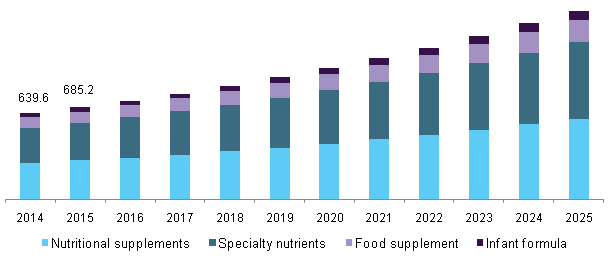This is part of our Ultimate Guide to Private Label Probiotics, a complete overview of the benefits of probiotic supplementation for consumers, some of the different strains and their specific uses, the process of responsibly manufacturing a probiotic product, and what to look for when choosing a probiotic manufacturer.
By now everybody knows that probiotics offer important health benefits and that different species and strains can provide more targeted support for specific conditions. One question some people still have, however, is whether it is better to eat probiotic foods or take a probiotic supplement?
Some Challenges With Food Sources Of Probiotics
For many years, the go-to source for probiotic consumption was yogurt. As research has continued to uncover many new and diverse benefits of probiotics, and manufacturers have continued learning how to best work with them, additional product options have been steadily introduced into the food and beverage marketplace.
Probiotics can now be found in many fermented foods and beverages. Some of the most common fermented foods that naturally contain probiotics are of course yogurt, but also kefir, kombucha, sauerkraut, pickles, miso, tempeh, kimchi, sourdough bread, and some cheeses. (Even salt-water brined olives can get into the game, as they undergo a natural fermentation producing two strains of live cultures; Lactobacillus plantarum and Lactobacillus pentosus.)
While the consumption of fermented foods and beverages can be helpful to maintain a healthy balance of bacteria in the digestive system, not all fermented products contain live, active probiotics. For example, some yogurt products are processed with heat after fermentation, which kills the beneficial active cultures created by the fermentation process. For this reason, the International Dairy Foods Association created the Live & Active Cultures (LAC) seal. This seal, which appears on some refrigerated and frozen yogurt containers, helps identify those products containing “significant” amounts of live and active cultures. It is not required, but manufacturers can choose to include it on the label of a yogurt product containing at least 100 million cultures per gram, (or 10 million cultures per gram if frozen), at the time of manufacture. The seal looks like this:

It is important to note, however, that the standard used for a product to qualify to use this seal is “at the time of manufacture”. There are many challenges in keeping these delicate microorganisms alive until they are eventually consumed. The transportation or storage of probiotics in an unsuitable climate, for example, can easily kill them. Therefore, learning how many CFUs were present “at the time of manufacture” is not a reliable measure of what is still viable at the time of consumption.
In general, probiotic-containing foods and beverages may not be sufficient on their own in providing significant health benefits for most people, due to the following reasons:
- Diet – Most people do not eat a variety of probiotic-rich foods on a daily basis. For several reasons, such as food allergies or a busy schedule, people are not able to fit a substantial amount of fermented foods and beverages into their diet.
- Individual need – Most individuals have specific health issues they are looking to improve. Supplements provide an opportunity to ingest targeted strains that have been shown to be helpful in addressing certain health conditions. In foods and beverages, products are geared more toward providing a general overall benefit with their probiotic content, and there is less control over strain-specificity.
Fortunately, food and beverage products are not the only way to obtain probiotics anymore. Although there are options beyond just yogurt available these days, probiotic dietary supplements can offer some distinct advantages.
Some Advantages of Probiotic Dietary Supplements
Recent advancements in dietary supplement probiotic manufacturing have resulted in a multitude of new products. These many options provide a broad range in potency, convenience, stability, and health benefits for the consumer. Probiotic dietary supplement products can now target almost every demographic and audience available.
There are several advantages to getting your probiotics through supplements:
Targeted Health Benefits
Supplements can provide more targeted benefits than food.
Everyday factors such as stress, travel, eating unhealthy foods, and even the use of some medications can upset the balance of healthy bacteria in the digestive tract. When this happens, it can lead to uncomfortable gastrointestinal issues and may impact overall health. Taking a probiotic supplement designed for daily use may be useful in helping to promote a balanced gut in its support of digestive and immune health, but a supplement targeted towards a specific condition might be even more beneficial.
Supplements can provide for more customization by including specific bacterial strains, which can be important for addressing a particular health issue. For example, although Lactobacillus and Bifidobacterium are the most commonly used strains, there are several other strains that can provide more diverse and specific health benefits. If the desired outcome of supplementing with probiotics is clearer skin, a strain that has shown to be helpful with this (Streptococcus thermophiles) may be more helpful than a strain that has been studied for its ability to support weight loss (Lactobacillus rhamnosus). There are probiotic supplement products available today featuring strains that have been researched for anxiety, depression, blood pressure, infection, and many other specific conditions.
Past and ongoing clinical research helps to identify which probiotic strains offer the greatest health benefits, either for overall health or for targeting specific conditions. Reliable probiotic manufacturers will work with trusted partners to incorporate these proven strains and then conduct their own testing to optimize their potency and stability within a finished product.
Supplements can also provide more probiotic diversity.
In addition to condition-specific bacterial strains, supplements also provide the opportunity to select a multi-strain blend for microbial diversity, versus a food product like yogurt which may only contain one or two strains.
Based on a number of studies, multi-strain probiotics appear to show great efficacy and beneficial effects on improving overall health. While many studies on probiotics look at the effects of individual strains, a recent paper examined the results of studies that looked at the effects of supplements containing multiple strains. The paper found that mixtures of probiotics had beneficial effects on multiple health conditions while boosting overall gut and immune function.
Multi-strain probiotics can be targeted towards a wide range of health issues including indigestion, irritable bowel syndrome, gut wellness, diarrhea, immune support, respiratory infections, gut microbiota modulation, digestive support, regularity, irritated bowels, gas & bloating, autism, depression, anxiety, and healthy mood support. The option to take just one product for such a broad spectrum of health benefits is both convenient and affordable.
Convenience
Shelf-Stable
While it may not be convenient to head out for the day with yogurt in hand, many of today’s probiotic supplements are well-suited for this. Shelf-stable probiotics, in the form of capsules, tablets, powders, or gummies have been designed to not require refrigeration.
There are many ways the probiotic manufacturer can achieve this stability. Some patented probiotic strains have been manufactured using specially designed processes that preserve and ensure the stability of the organisms without the need for refrigeration. There are also some spore-forming probiotic bacteria that are naturally shelf-stable. Spore-forming probiotics are soil-based organisms, or SBOs. These are bacteria that are naturally found in the dirt, not in the human body. Most have evolved over thousands of years to develop a hard “shell” around them, which is what allows them to be shelf-stable.
Bacillus coagulans and Bacillus subtilis are two strains known to not only survive but even to thrive at room temperature. In addition, Saccharomyces boulardii, (a unique probiotic yeast) survives well at room temperature and has been gaining in popularity due to its benefits and somewhat unique vegan status.
Food Sensitivities / Allergies
Many probiotic supplements are both allergen-free and sweetener-free. With the very common food sensitivities or allergies present today, many people cannot (or try not to) consume any products containing dairy, soy, wheat, gluten, artificial colors, flavors, or sweeteners. Probiotic supplements can be helpful in avoiding these allergens, added sugar, and/or other sweeteners that are often found in probiotic foods such as yogurt, kefir, and kombucha. This is also important as sugar may negatively impact the balance of beneficial bacteria in the gut.
Controlled Dosage
CFU Count and Potency
As previously mentioned, foods generally deliver a lower CFU count per serving than a probiotic dietary supplement can. Additionally, and unlike most food and beverage products, the label of a probiotic dietary supplement will list the CFU count as either “at time of manufacture” or “through expiration“, allowing the consumer some insight into what they may (or may not) be getting.
A high CFU count is not always necessary. For consumers taking a probiotic supplement for general health and wellbeing, a product with a range of 5 – 10 billion CFUs should be sufficient. For those who are taking probiotics to address a specific ailment, however, a product with a higher CFU is more effective. There are many probiotic products currently available that list a CFU count of 50 billion or higher, which is a count you would not find in a typical food or beverage.
The CFU count of a product is not the only component that determines the potency of a probiotic formula. The quality of the strains is important as well. Factors such as oxygen, temperature, and humidity may have an impact on maintaining the viability of the strains at sufficiently high levels to ensure their therapeutic activity throughout their shelf life. Additionally, variations in manufacturing processes, the quality between batches, and even packaging selection may have an impact on the final products.
As not all probiotic strains are able to survive their journey through the various acids and enzymes contained in the stomach, this means that they are no longer alive, or therefore beneficial, once they reach the gut. When evaluating these products, it can be helpful to identify any that contain the types of strains that are known to survive these stomach conditions.
Branded or trademarked probiotic strains are a good indicator that the strains within a formula are hardy enough to survive the stomach. Many of these have been specifically designed to be able to adapt to extreme changes in the environment, such as stomach acid or even temperature, and will have the supportive research to show that they achieve this. If the product is using one of these strains, they will identify it on the product label. These strains may be listed with a “TM” or “®” symbol behind their name.
Another way the probiotics could survive stomach acids and digestive enzymes would be if the product used a special capsule to protect the organisms, such as an enteric-coated or “DR” (delayed-release) capsule. These capsules are specially formulated to survive their journey through the stomach so that the probiotics within them can be safely transported to the gut. If specialty capsules such as one of these are being used to protect the probiotics, they should also be noted on the product label.
Summary
Probiotics in their various supplement forms provide the consumer with an opportunity to ingest more diverse strains and in more potent amounts than can be obtained through foods alone. Additionally, their availability as capsules, chewable gummies, protein powders, and more offer convenience. These many options provide consumers with the freedom to take these products when they want to, with or without the presence of food, in the form they prefer.
The ability for these products to fit into any lifestyle, the increased awareness among consumers of their benefits, and continued supportive research from the scientific community are the key factors driving the growth of the probiotics segment in the dietary supplement industry.

Key Takeaways
- Although probiotics can be found in foods and beverages, there may be advantages to taking probiotics as supplements.
- Consumers can select dietary supplements containing specific strains of probiotics that target health conditions beyond general digestive and gastrointestinal health.
- The various types of probiotic products available as dietary supplements make it very convenient for consumers to fit into their lifestyle.
- The probiotics category in the dietary supplement industry is among the fastest growing segments, with forecasted continued growth for the next 5+ years.
Next: ➤ Learn More About the Essentials of Manufacturing Private Label Probiotics.

†These statements have not been evaluated by The Food and Drug Administration. This product is not intended to diagnose, treat, cure or prevent any disease.





